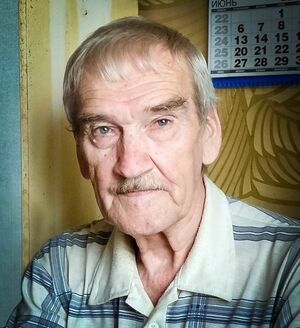Stanislav Petrov (nonfiction): Difference between revisions
m (Admin moved page Stanislav Yevgrafovich Petrov (nonfiction) to Stanislav Petrov (nonfiction)) |
No edit summary |
||
| (One intermediate revision by the same user not shown) | |||
| Line 1: | Line 1: | ||
[[|thumb|Stanislav Yevgrafovich Petrov]]'''Stanislav Yevgrafovich Petrov''' (Russian: Станисла́в Евгра́фович Петро́в; 7 September 1939 – 19 May 2017) was a lieutenant colonel of the Soviet Air Defense Forces who became known as "the man who single-handedly saved the world from nuclear war" for his role in the 1983 Soviet nuclear false alarm incident. | [[File:Stanislav Yevgrafovich Petrov.jpg|thumb|Stanislav Yevgrafovich Petrov]]'''Stanislav Yevgrafovich Petrov''' (Russian: Станисла́в Евгра́фович Петро́в; 7 September 1939 – 19 May 2017) was a lieutenant colonel of the Soviet Air Defense Forces who became known as "the man who single-handedly saved the world from nuclear war" for his role in the 1983 Soviet nuclear false alarm incident. | ||
On 26 September 1983, three weeks after the Soviet military had shot down Korean Air Lines Flight 007, Petrov was the duty officer at the command center for the Oko nuclear early-warning system when the system reported that a missile had been launched from the United States, followed by up to five more. Petrov judged the reports to be a false alarm, and his decision to disobey orders, against Soviet military protocol, is credited with having prevented an erroneous retaliatory nuclear attack on the United States and its NATO allies that could have resulted in large-scale nuclear war. Investigation later confirmed that the Soviet satellite warning system had indeed malfunctioned. | On 26 September 1983, three weeks after the Soviet military had shot down Korean Air Lines Flight 007, Petrov was the duty officer at the command center for the Oko nuclear early-warning system when the system reported that a missile had been launched from the United States, followed by up to five more. Petrov judged the reports to be a false alarm, and his decision to disobey orders, against Soviet military protocol, is credited with having prevented an erroneous retaliatory nuclear attack on the United States and its NATO allies that could have resulted in large-scale nuclear war. Investigation later confirmed that the Soviet satellite warning system had indeed malfunctioned. | ||
| Line 19: | Line 19: | ||
* [https://en.wikipedia.org/wiki/Stanislav_Petrov Stanislav Yevgrafovich Petrov] @ Wikipedia | * [https://en.wikipedia.org/wiki/Stanislav_Petrov Stanislav Yevgrafovich Petrov] @ Wikipedia | ||
[[Category:Nonfiction (nonfiction)]] | [[Category:Nonfiction (nonfiction)]] | ||
| Line 25: | Line 24: | ||
[[Category:Nuclear warfare (nonfiction)]] | [[Category:Nuclear warfare (nonfiction)]] | ||
[[Category:People (nonfiction)]] | [[Category:People (nonfiction)]] | ||
Latest revision as of 10:17, 19 May 2019
Stanislav Yevgrafovich Petrov (Russian: Станисла́в Евгра́фович Петро́в; 7 September 1939 – 19 May 2017) was a lieutenant colonel of the Soviet Air Defense Forces who became known as "the man who single-handedly saved the world from nuclear war" for his role in the 1983 Soviet nuclear false alarm incident.
On 26 September 1983, three weeks after the Soviet military had shot down Korean Air Lines Flight 007, Petrov was the duty officer at the command center for the Oko nuclear early-warning system when the system reported that a missile had been launched from the United States, followed by up to five more. Petrov judged the reports to be a false alarm, and his decision to disobey orders, against Soviet military protocol, is credited with having prevented an erroneous retaliatory nuclear attack on the United States and its NATO allies that could have resulted in large-scale nuclear war. Investigation later confirmed that the Soviet satellite warning system had indeed malfunctioned.
In the News
Fiction cross-reference
Nonfiction cross-reference
External links:
- Stanislav Yevgrafovich Petrov @ Wikipedia
